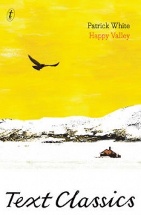Happy Valley by Patrick White

Text Publishing, 2012. ISBN 9781921922916.
(Age: Mature secondary - adult) Highly recommended. Appearing on
best-books-of-the-year lists, the new publication of Patrick White's
Happy Valley brings it back into print after a seventy year
hiatus. White was apparently concerned about charges of racism and
so limited its availability during his lifetime. It is a significant
work, not just because it is White's first novel; and it could form
a fascinating partnership with White's final, unfinished novel, The
Hanging Garden (Random House) for senior English study. Both
novels exude verdant symbolism as an atmospheric meter of emotion
and incident. Both novels validate the feelings and insights of
children and feature a friendship between a vulnerable boy and girl.
In Happy Valley, school-girl Margaret Quong is the enigmatic
daughter of an Anglo-Chinese father and Australian mother. Set in
the early 1930s, a tired, small-town racism exists, but hostility is
also easily turned onto anyone who destabilises the currents of the
ironically named Happy Valley. Newcomer, farm overseer, Clem Hagan,
emits a dangerous, hard sexuality. White skilfully introduces him
and then turns his focus onto a range of other town inhabitants.
Even though the lives of the other characters are gripping, we know
that Hagan's character is waiting on the edge, changing the dynamics
and likely to precipitate a tragedy.
Two of the featured families, the Hallidays and the Moriartys, seem
to be dissimilar; apart from teacher, Ernest Moriarty's asthma and
Hilda Halliday's consumptive cough but their spouses' affairs with
others make them incongruously alike. It is the children, Margaret
and Rodney Halliday, who recognise truth first. The adults must
later choose their own futures.
Patrick White's writing is laden with experimental devices. He
judiciously (some may disagree) uses stream-of-consciousness,
repetitions, unconventional word order in sentences and perfectly
formed and injected images. The writing techniques alone deserve
study and critique.
Joy Lawn